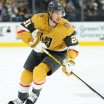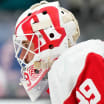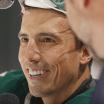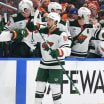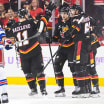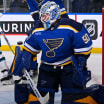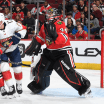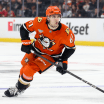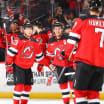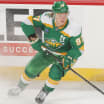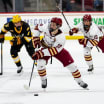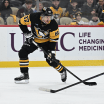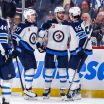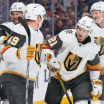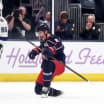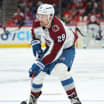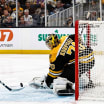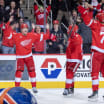LAS VEGAS -- Nick Robone smiled, his scars hidden under his shirt. He sounded like a hockey coach as he quoted author Charles R. Swindoll: "Life is 10 percent what happens to you and 90 percent how you react to it." If he expects his players to have that attitude, he'd better have it too, he said.
He grew up in Las Vegas loving hockey. He played defense at UNLV and became an assistant there. Then the program rose to the Division I club level and moved into City National Arena, the new practice facility of the Vegas Golden Knights, an NHL expansion team and Las Vegas' first major league sports team.
UNLV coach has used Golden Knights' success to cope following shooting
Injured Oct. 1, says run to Cup Final against Capitals has helped city after tragedy
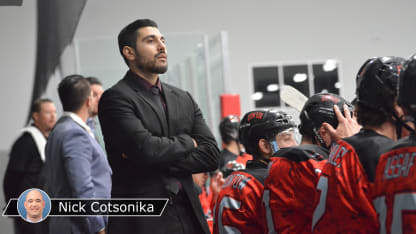
After Robone took a bullet to the chest in the mass shooting on the Strip on Oct. 1, the Golden Knights visited him in the hospital, gave him reason to cheer, honored him at a game and invited him to learn from them. Now he's almost fully recovered, and they're in the Stanley Cup Final, though they trail the Washington Capitals 3-1 in the best-of-7 series, with Game 5 at T-Mobile Arena on Thursday (8 p.m. ET; NBC, CBC, SN, TVAS).
RELATED: [Complete Golden Knights vs. Capitals series coverage]
"This city has been waiting -- really, I would say, half a century -- just to have some type of professional sports team at the highest level," he said. "You see a lot of people kind of badgering it. 'Oh, you know, you haven't had to wait 40 years.' Things like that. We've had to wait decades just to have a team to cheer for.
"I think the success on top of that is just a bonus, really. It's just something that we've been itching for. It's turned it from a city to a community. And obviously it came at the perfect time. The city needed to heal from a tragedy like that."
* * * * *
Robone, 28, played in a men's league game at City National Arena on Oct. 1, then raced down to the Route 91 Harvest Festival to listen to country music with his brother, Anthony, and some friends. He was late but made it to see the final act, Jason Aldean.
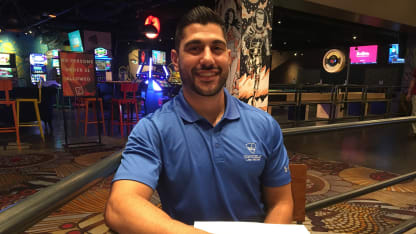
He was on the right side of the stage next to the VIP tent when he heard a couple of noises. Didn't think much of it. Then he heard a steady barrage. Fireworks? He looked into the sky but didn't see anything. Aldean sort of stopped playing. Blown speaker?
"And then all of a sudden it goes again, and I crouch down," Robone said. "I'm facing Mandalay Bay. It was probably right there, like, second barrage, boom, I got shot."
The gunman had fired a bullet from the 32nd floor of the Mandalay Bay across Las Vegas Boulevard into Robone's upper left chest, and it had lodged in his lat muscle. But he didn't realize it yet. He felt it on his side more than his chest. It hadn't knocked him over. He was still crouched.
"And then blood started coming out of my nose and mouth, and I told my brother. 'Hey, I got shot,' " Robone said. "He looks back, and then we realized these were gunshots."
Robone had gone to the festival for three days, but his brother had gone only on Oct. 1 -- and his brother was a firefighter paramedic in the Henderson Fire Department. Another friend, Billy Tufano, was a trained paramedic too.
Nick put one arm around Anthony and the other around Billy, and they ran to where they thought the medical tent was. It was packed. So they made their way outside the venue and found a police car. Anthony tried to open the doors, trying to find a first-aid kit. Finally, he got one from an officer, removed the plastic wrap and put it over Nick's wound to keep out air in case of a punctured lung.
They got farther away and found ambulances. Anthony and Billy triaged the injured, and some were in worse shape. So Nick waited his turn. Eventually, he got in an ambulance and headed to Sunrise Hospital, while Anthony and Billy stayed behind to help.
"Don't really know if I'm going to be good, but at the time, I'm like, 'I think I'm going to be OK,'" Nick said. "You never want to think bad. The whole time, just breathing, making sure you're focusing on that. I didn't want to panic."
Sunrise's emergency department has about 45 beds. It received 212 documented patients in a span of about 60 minutes. Amid the chaos, Nick had to walk off the ambulance and sit on a bed for about 15 minutes before he was triaged.
"They were like, 'Hey, we've got to get you into surgery, like, now,'" Nick said. "I'm like, 'OK.' So they brought me in. I was just trying to stay still and make it as easy on them as I possibly could. And then I woke up two days later."
Nick was in surgery for about five hours. Doctors removed the bullet and confirmed it hadn't hit his heart, lungs or arteries. But he had a badly bruised left lung and had to be put on a ventilator and into an induced coma.
"It's going to be a long recovery process, but my brother is the toughest guy I know," Anthony said in a press conference Oct. 3. "I think the amount of support from the community -- the hockey community, the firefighter community] -- it just represents and reflects the kind of guy he is. He's one of the best guys I know. I think if you ask anyone on the streets who knows him, they're pulling for him, and he's going to be all right."
\* \* \* \* \*
Hundreds were injured and 58 killed in the worst mass shooting in modern American history. The Golden Knights visited victims, families, first responders and blood donors in the days afterward.
Pierre-Edouard Bellemare,
[Reid Duke
, Deryk Engelland, Jon Merrill, Luca Sbisa, Nate Schmidt and Reilly Smith visited Robone in intensive care when they made their rounds at Sunrise on Oct. 4. Weeks before, Engelland and Robone had been at the wedding of a mutual friend.
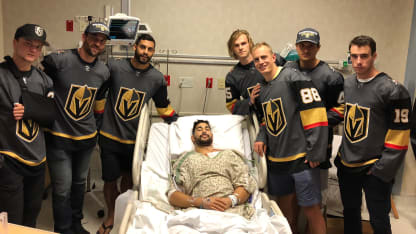
"They came in and talked to me for a bit," he said. "I don't remember really what I was saying."
Some buddies visited Robone two days later. They watched hockey -- UNLV on one screen, Vegas on another. In the past, they cheered for different NHL teams. But now they had the Golden Knights, and in their first regular-season game, they came back to win 2-1 after two third-period goals by forward James Neal.
"I was like, 'This is so weird. We're all cheering for one team, and it's never been like this before,'" he said. "And then they win that game, and it was just crazy. … It was nuts in the hospital room."
Robone was released from the hospital Oct. 10, right before the Golden Knights' home opener and emotional pregame ceremony honoring victims, families and first responders. He watched it at home. He was honored before the national anthem at their next game, against the Detroit Red Wings at T-Mobile Arena on Oct. 13.
"Pride," he said. "Had a lot of pride for the city. It was just cool to see, because I hadn't been to a game yet, and so my first game there was just packed. I'm on the ice. The intensity the crowd had, it was incredible. I love the city. I'd do anything for it. I want to be an ambassador for hockey in the city, for sure. So it was a special moment."
Robone is an active person, and for a month, he couldn't do much. He hung out on the couch, walked when he could, did breathing exercises to strengthen his lungs. But it's 90 percent how you react to it, right?
"It was kind of frustrating," he said. "But how frustrated can you be? You just survived a mass shooting."
He went to practices, made plans, wrote up reports, studied video and watched the Golden Knights, who often skated after UNLV did. He slowly got better and started physical therapy in December. One day, the Golden Knights coaches invited him to sit in on a video session and showed him how they broke down the game.
"He's a great guy, and we're thankful he's healthy and getting better," Golden Knights coach Gerard Gallant said. "He just wants to be around hockey. So it was a very positive experience for our group."
In January, Robone returned to the ice with UNLV and to his job as a marketing manager with Topgolf. He sat down with Golden Knights assistant Ryan Craig two or three times to talk hockey and pick his brain, and with Golden Knights video coach Tommy Cruz to learn about the software he uses. He bought an 11-game ticket package and went to all 11 games, plus two against the Los Angeles Kings in the Western Conference First Round.
"It provided three hours of relief every time there was a game for the entire city," he said.
Robone estimated he had lost about 25 pounds. He said his chest still didn't feel normal and probably wouldn't be fully healed for another few months. But in March, more than five months after he last played at City National Arena on Oct. 1, he played there again.
"Even though it's men's league, it's the whole thing -- the camaraderie of being with the guys, just stepping foot on the ice and playing," he said. "Yeah, you're not playing at the same level that you maybe once were. But, you know, you miss it. You miss it that much more when you physically aren't allowed to do it. Every Sunday, I'm there religiously.
"It's something that I preach to our guys too. Don't take it for granted. You really never know."
